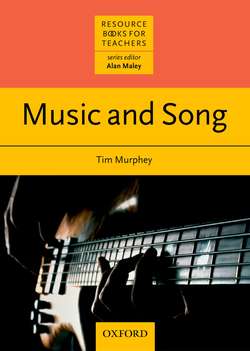Music and Song

Реклама. ООО «ЛитРес», ИНН: 7719571260.
Оглавление
Tim Murphey. Music and Song
Acknowledgements
The author and series editor
Foreword
Introduction
How to use this book
1 Tuning in
1.1 Musical introduction cards
1.2 Pop picture collage
1.3 Pop picture twenty questions
1.4 Hit chart
1.5 Music questionnaires
1.6 Music survey
1.7 Music newsletter
1.8 Star reports
1.9 Extreme opinions
1.10 Weekly song rota
1.11 Favourite song roll call
2 Just music
2.1 Starting with music
2.2 Background music
2.3 Stop and find
2.4 Musical reactions
2.5 My favourite moment
2.6 Stream of consciousness writing
2.7 Film music
2.8 Advertising jingles
3 The artists and the industry
3.1 Who am I?
3.2 Sorting artists
3.3 Proximity genre map
3.4 Identity cards
3.5 Magazine interview
3.6 Role-play interview
3.7 Pop group interview
3.8 Musical words list
3.9 Music journal
3.10 Hit chart: story writing
3.11 Hit chart: discussion
3.12 Pop songs: discussion
3.13 Pop industry: discussion
3.14 Song dependency
3.15 Working with quotations
3.16 Song titles: grammar focus
4 Using songs
4.1 Text completion and construction
4.2 Jumbled lyrics
4.3 Writing to known tunes
4.4 Song line answers
4.5 Partial song dictation
4.6 Mass distance dictation
4.7 Changing the texts
4.8 Group songwriting
4.9 Poetic analysis of lyrics
4.10 Lyric-writing contest
4.11 The ‘English’ of pop lyrics
4.12 Discourse analysis of pop songs
4.13 Photo-story dialogue writing
4.14 Songs and story writing
4.15 Songs to literature
4.16 Song feedback
4.17 Cultural comparison and contrasts of music
4.18 Unknown songs and artists
4.19 Singing, singing, singing
4.20 Song rotation dictation
4.21 Recording opinions
4.22 Open selection song lab
4.23 Name those songs
4.24 Tape exchange
5 Video song clips
5.1 Brainstorming
5.2 Freeze-frame
5.3 Prediction vocabulary list
5.4 Half n’ half
5.5 Hear all about it!
5.6 Guessing the music and song
5.7 Creating dialogues
5.8 Guessing video from song text or audio tape
5.9 Using the present perfect
5.10 Using the past continuous
5.11 Countdown exercise
5.12 Some know, some don’t
5.13 Exploring socio-cultural symbols
5.14 What makes a good video?
5.15 Making video clips
5.16 Using an outline
6 With young children
6.1 TPR shouting up/down
6.2 Chorus back-chaining
6.3 Jazz chants
6.4 TPR hiking jazz chants
6.5 Action songs
6.6 Repetition songs
6.7 Role-play songs
6.8 Drop-a-word songs
6.9 Class cassette
6.1 °Class songbook
Appendix
1 Songs: academic and grammatical categories
2 Songs: contemporary thematic categories
3 Magazines for lyrics to current songs, articles, and photos
4 Case history of a pop video in the classroom
5 Testing with songs
Annotated bibliography
Отрывок из книги
This book began when my two elder sisters encouraged me to sing (not always in tune!) with them as a young child, and I got hooked on music. They taught me that joy was more important than perfect pitch. For the academic background, I was helped greatly to understand the power of the medium by Jean-Paul Bronckart, Bernard Py, and Georges Denis Zimmermann, who guided my PhD research on the use of music and song in language learning.
Many other kind musical souls read and commented on previous drafts of this book, providing valuable input and encouragement. Thea Bredie, from Holland, stimulated me greatly with her initial questions and valuable comments. Rod and Sonja Nash, teaching in Germany, have corresponded with me for several years on the topic. I found Dennis Davy and his dissertation on the subject (unfortunately after I had finished my PhD on the same) and discovered a soulmate in his ideas and experience from teaching in Japan and the Arab world. Readers in Japan, teaching a variety of languages at different levels, have helped me shape the book further: Lila Madge, Felicia Rey, Gary Beaubouef, Raoul Holland, Tadashi Sakamoto, and Gabriel Yardley. Two anonymous OUP readers also gave valuable feedback. Finally, Alan Maley’s engaging advice and personal interest greatly influenced the book’s final form.
.....
Nanzan University
The publisher and author would like to thank the following for their kind permission to use articles, extracts or adaptations from copyright material. There are instances where we have been unable to trace or contact the copyright holder before our printing deadline. We apologize for this apparent negligence. If notified the publisher will be pleased to rectify any errors or omissions at the earliest opportunity.
.....